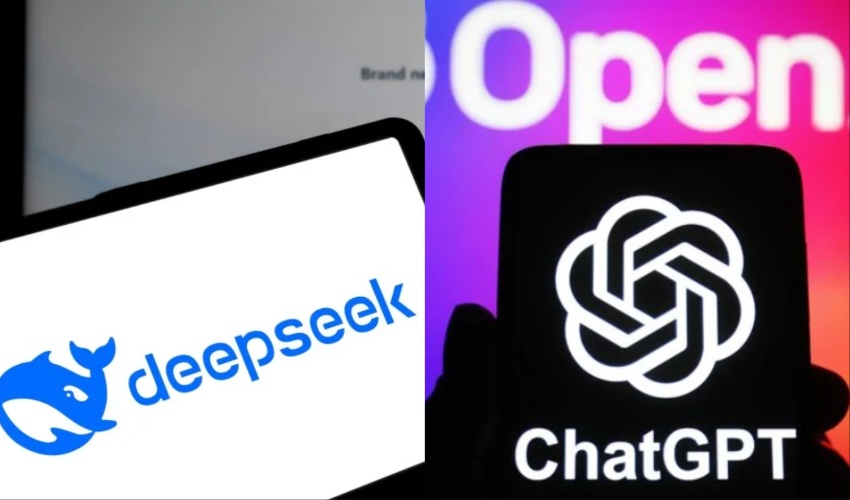Chinese artificial intelligence (AI) startup DeepSeek has dethroned OpenAI’s ChatGPT to become the top-ranked free application on Apple’s App Store in the United States.
The milestone, achieved just days after the company’s AI assistant was launched on January 10, has not only disrupted the competitive landscape of generative AI but also raised questions about the effectiveness of US export controls aimed at curbing China’s technological advancements.
DeepSeek’s rise to prominence
The DeepSeek AI assistant, powered by the company’s flagship R1 model, quickly surged in popularity among US users, according to app analytics firm Sensor Tower. By January 20, the app had climbed to the No. 1 position on the App Store's Top Free Apps chart, a testament to its rapid adoption.
Led by Liang Wenfeng, a former quantitative hedge fund manager, DeepSeek’s accomplishment is particularly notable given its limited resources compared to US tech giants such as OpenAI, Google, and Meta. The Hangzhou-based startup trained its cutting-edge DeepSeek-V3 model for under $6 million using approximately 2,000 Nvidia H800 chips.
In contrast, US firms have invested billions in acquiring Nvidia’s flagship H100 chips to train their large language models (LLMs). These chips, known for their high data transfer rates and computational efficiency, remain out of reach for Chinese companies due to US export restrictions.
Despite these constraints, DeepSeek's R1 has matched or even outperformed some of the most advanced AI models globally, as claimed by its developers.
Implications for US export controls
The achievement has sparked a debate over the efficacy of US sanctions designed to limit China's access to advanced AI technologies. Since 2021, the Biden administration has expanded export bans on high-performance chips to prevent their use in training AI models by Chinese firms.
However, DeepSeek’s ability to innovate using the less powerful H800 chips has raised concerns among US tech executives. In a research paper released in late December, DeepSeek researchers detailed their efficient approach to training AI models, which involved leveraging the H800 chips to achieve performance benchmarks comparable to those of US-based systems.
“The fact that DeepSeek has been able to achieve this level of sophistication at a fraction of the cost highlights a potential loophole in the current export control framework,” a US tech industry insider told Dawn.
Founded in 2023, DeepSeek is a relatively new entrant in the AI sector. The company was established in the wake of Baidu’s release of China’s first large-language model, sparking a wave of AI development in the country. While several Chinese tech companies have since introduced their own AI models, DeepSeek is the first to gain widespread recognition in Silicon Valley for competing head-to-head with US-developed systems.
Its DeepSeek-V3 model, the driving force behind its AI assistant, has been lauded for its versatility and efficiency. According to the company, the model "tops the leaderboard among open-source AI systems and rivals the most advanced closed-source models globally."
This recognition has left a significant impression on Silicon Valley, challenging long-held assumptions about US dominance in the AI sector.
ChatGPT falls to second place
Meanwhile, OpenAI’s ChatGPT, which had long dominated the App Store rankings, has now been relegated to the second position. OpenAI, a pioneer in generative AI, has faced growing competition from emerging players like DeepSeek.
In 2021, OpenAI partnered with the US federal government to invest $500 billion in AI infrastructure over four years. While the initiative has supported advancements in generative AI, DeepSeek’s unexpected success has highlighted the possibility of achieving similar results with significantly fewer resources.
DeepSeek’s ascent underscores the shifting dynamics in the AI sector. As Chinese startups continue to innovate despite geopolitical and technological barriers, US policymakers may need to reassess their strategies to maintain a competitive edge.
For now, DeepSeek’s rise serves as a stark reminder that technological breakthroughs can come from unexpected quarters, challenging the status quo and reshaping global perceptions of innovation.
Spokespeople for DeepSeek, OpenAI, and Meta declined to comment on the developments. However, analysts believe that the rapid rise of a relatively obscure Chinese startup could serve as a wake-up call for US tech firms to double down on innovation.



























